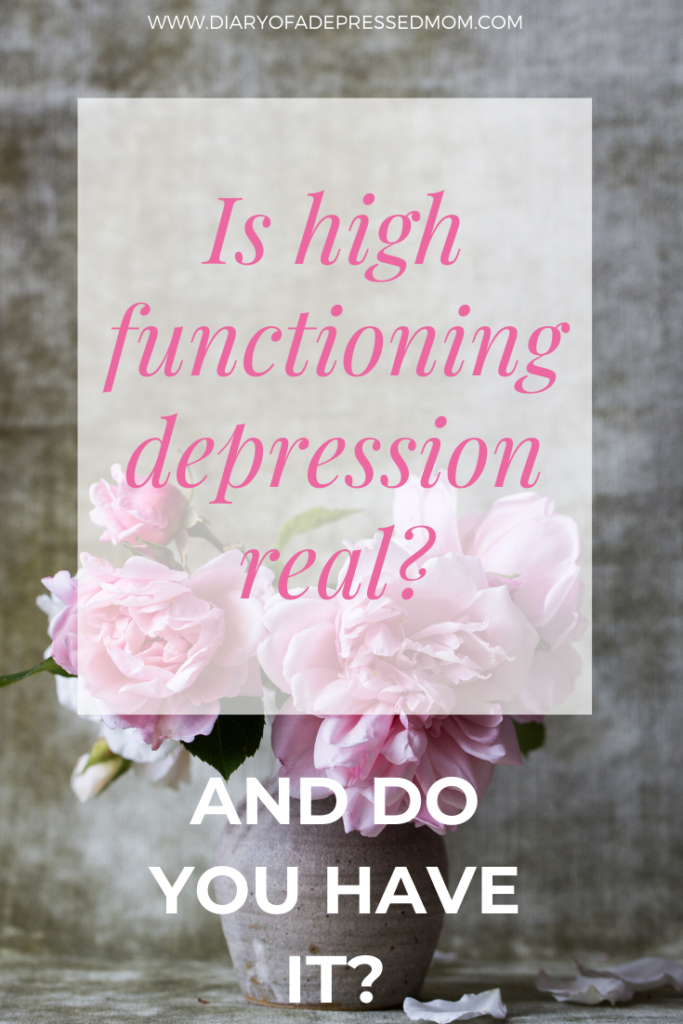Do I Have Dysthymia?
What the heck is that? you ask.
Dysthymia is the clinical fancy name for high functioning depression.
I was browsing YouTube a few weeks ago and I came across a video that explained what high functioning depression was, to be completely honest I had always told myself that this is the type of depression I had even though realistically I didn’t even know it was a real thing.

My husband has told me for years that it is so weird how I suffer from depression so much but that I still do everything and more, than the normal person who doesn’t have depression does.
Because really he is right, I do everything a mother with kids does.
I get up every morning, make breakfast, clean the house, even make my bed. I run all the errands and usually get some sort of dinner on the table by 5 each night….
But how can someone who has suffered with depression for over a decade do all this and still seem somewhat normal on the outside?
Well, come to find out years and years later I really do have high functioning depression AKA Dysthymia.

The video I came across was absolutely mind-blowing because the therapist who was talking was describing the symptoms of Dysthymia and EVERY SINGLE ONE SHE MENTIONED I had!
I was blown away that she described how I was feeling with exactness!
I immediately sent the video to my husband and said, “This is EXACTLY how I feel all the time!”.
Low-Grade Depression
In the video, she explains that Dysthymis is a low-grade depression, not meaning that it is any less real, relevant, or hard to live with, but that it doesn’t have as many major peaks and valleys as some of the other types of depression.
People who suffer from Dysthymia aren’t even diagnosed with it until as an adult they have ongoing symptoms for at least 2 years. (1 year for a child).
Constant underlying sadness
Generally speaking, High functioning depression is a feeling of constant underlying sadness, that usually doesn’t ever leave.
People who suffer with it usually seem to others to be feeling normal on the outside and in social situations, but on the inside, they can majorly be suffering and hurting.
Other symptoms of Dysthymia
On the Mayo Clinic’s website, they say these other symptoms are common with Dysthymia
- Loss of interest in daily activities
- Sadness, emptiness or feeling down
- Hopelessness
- Tiredness and lack of energy
- Low self-esteem, self-criticism or feeling incapable
- Trouble concentrating and trouble making decisions
- Irritability or excessive anger
- Decreased activity, effectiveness, and productivity
- Avoidance of social activities
- Feelings of guilt and worries over the past
- Poor appetite or overeating
- Sleep problems
If these symptoms have been with you, or you have noticed them in someone you love for at least 2 years you or they might be suffering from Dysthymia too.
Here is the video that brought me so much peace knowing that what I was feeling wasn’t all in my head, and it is a real thing.

If you feel you have Dysthymia PLEASE get help as soon as possible.
The sooner you get help the sooner you can find what you need to better cope or to even be cured completely.
Common ways that help people get through this is Talk therapy. If not just Talk Therapy it can be paired with talk therapy and medication.
Talk therapy is basically talking it out it with a therapist or another person that can help mainly by listening.
A therapist can help you learn new skills to cope with your depression.
It gives you a chance to sort things out in your mind by having someone else there to listen who understands what you are going through.
This treatment will take time to feel the full affects of it but after you meet with a therapist I can almost guarantee you will feel an almost instant boost of hope.
Whatever it takes don’t wait for another second go now and get the help you deserve and need.
Do you have high functioning depression too?
What are some of the ways you find to cope?
Diane
I struggled with low emotions for years. Each mental health specialist I went to called it by a different name. I tried all the medication, all the diets and exercise and mindfulness meditations out there (exercise helped me more than anything). Nothing “fixed” it. When menopause hit, I really sunk low. I had a complete hysterectomy and the despair left, but helllo hot flashes, thinning hair and poor memory. There is hardly any research on how hormones affect our moods, although it’s a standing joke that women go mental on their periods. What I found out was that I had been estrogen dominate. I was always happy and upbeat during pregnancy when progesterone is higher. My OBGYN first tried giving me birth control pills that are supposed to ease the severity of PMS, but it just made it worse. Then I was given estrogen cream and about went crazy. No one mentioned progesterone, and my OBGYN gave up, saying it must be something else. I didn’t have classic PMS, but my hormones constantly fluctuating did me in. Each child I had made the symptoms more severe. I now have legitimate reasons to be depressed because of what has happened in my life. But, it never gets dark and hopeless like it used to. I wish more research about women’s reproductive heath were being done.